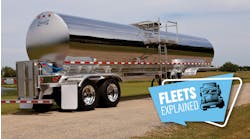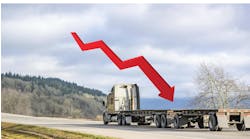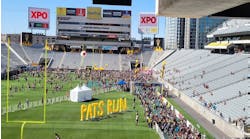There aren't many utility providers in this country capable of offering customers four separate services from under one roof. The Knoxville Utility Board (KUB) happens to be one of the very few that does. In operation as KUB since 1938, the company started out as an electric utility provider, later evolving to include gas, water and wastewater services as well.
“There are some 434,000 customers currently using one or more of our utility services,” says David Forster, fleet supervisor for KUB. “We serve all of Knox County, TN, as well as portions of seven other surrounding counties.”
According to Forster, there are over 900 pieces of equipment in the fleet, including 575 power units comprised mainly of International and Freightliner medium and heavy-duty chassis, as well as Chevrolet and Ford light trucks.
“We try to build and spec vehicles to be versatile. We like to rotate the trucks throughout the fleet as much as possible to extend their useful life,” Forster explains. “For example, we'll spec our crew trucks with a large enough cab, chassis, body, frame and suspension package so that if, say, after working in the gas department for five years the vehicle has high mileage on it, that unit can be rotated to another side of the utility where it will get less wear and tear, like the water department.”
Of course, depending on the nature of the job, some vehicles in the KUB fleet are not rotated. Overhead bucket trucks, for example, are built to perform a single function and as such are dedicated to the electric side of the business. “We run somewhere in the neighborhood of 35 to 40 different bucket trucks on a daily basis,” Forster states. “The utility bodies on most of our 3/4- and one-ton trucks, however, are standardized so they can still be rotated through the different fleet departments. The most common utility body we spec is from Knapheide.”
When Forster first began working for KUB in 2000, the company launched a corporate-wide initiative to begin using alternative fuels in the fleet vehicles as much as possible. Now “our entire fleet is powered by some sort of cleaner burning fuel,” he reports.
“We started with B-20, a standard 20% biodiesel blend, which was used as an alternative fuel in our diesel-powered equipment. From there we progressed into other types of alternative fuels. Currently, we've got 286 B-20 powered vehicles, 185 items that run off E-10 (10% ethanol), 33 that run on E-85 (85% ethanol), 63 dual-fueled vehicles, which use a mixture of CNG (compressed natural gas) and E-10, and three dedicated-CNG trucks.”
Completing the list of alternative fueled fleet vehicles are four, 1/2-ton Chevrolet Hybrid pickup trucks, as well as two leased Ford Hybrid Escapes, which KUB's CEO and COO have been driving for the last two years.
This fall, Forster notes, KUB will be taking delivery of a brand new 2008 Hybrid bucket truck, which is a joint-venture between Altec and International Truck & Engine Co. “There are only 24 of these trucks in use right now, and there will be only 75 to 100 of these vehicles produced next year,” he comments. “They run off a combination of B-20 fuel, plus hybrid components. We're very fortunate to be one of just a few utilities around the country who will receive one of these hybrid trucks.”
To keep track of the various types of alternative fuels, including deliveries and actual usage, by vehicle, KUB began using the E.J. Ward fuel management system two years ago. Prior to that, using just manual recordkeeping methods, unaccounted for fuel was consistently at 24% for the fleet. “The E.J. Ward automated system was the tool we needed to accurately monitor fuel use. We're now at zero percent unaccounted for fuel.”


